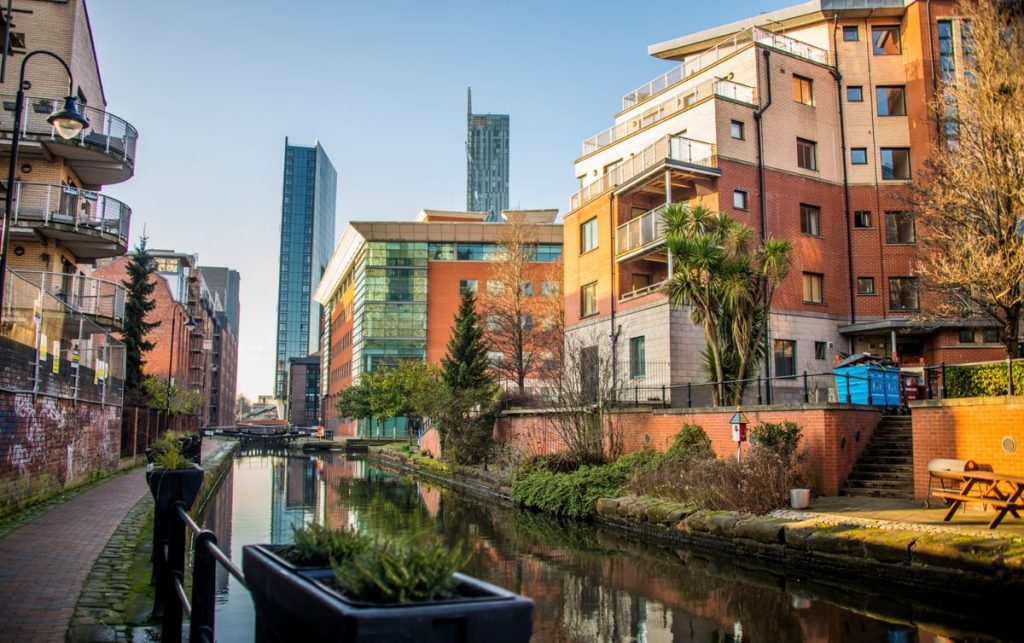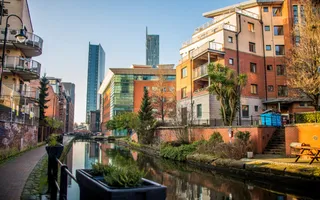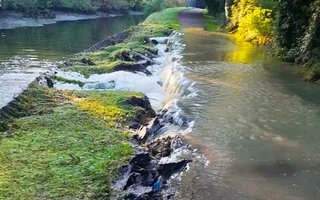Historic canals championed as solutions to UK’s modern challenges

A new report demonstrates how the UK’s unique network of historic canals, a legacy of the Industrial Revolution, are being repurposed to address some of the greatest challenges facing society.

Rochdale Canal, Manchester
The interconnected and ecologically rich man-made waterways are today playing a key role in addressing the UK’s biodiversity crisis, improving public health and helping to mitigate the impacts of climate change.
Our commitment
We’ve published our Impact Report that shows our canal network is proving more relevant than ever. The Report also showcases the our commitment to keeping canals open and alive in the face of some serious threats.
The UK is one of the most nature-depleted countries in the world, but canals provide a lifeline for wildlife. Forming the nation’s longest corridor of freshwater habitat, canals create “nature highways” that provide essential linking habitats that allow species to thrive and move safely through the nation’s increasingly fragmented landscape. The Report highlights how the network includes 304 conservation areas, 68 Sites of Special Scientific Interest, and countless corridors rich in biodiversity.
As part of out commitment to nature recovery, for the first time, we’ve been able to map the ecological footprint of its waterways, uncovering the rich diversity of habitats that underpin resilient ecosystems. The charity’s canals and rivers flow through 32 of the 48 Local Nature Recovery Strategy areas and we are impressing upon local authorities the importance of embedding canals into local nature recovery strategies, unlocking their role in reversing biodiversity loss while creating greener, more sustainable communities.
Tackling the nation’s public health crisis
Access to nature-rich green spaces is widely recognised as benefitting mental health, and the canal network’s blue-green spaces are uniquely positioned to combat the nation’s public health crisis. Over nine million people live within a 15-minute walk of a canal, and research shows that visiting canals and rivers improves mental wellbeing by 6% – a statistically stronger impact than green spaces alone.
In areas experiencing health and wellbeing inequalities, canals offer vital respite. Over half of households in these areas have access to a canal, providing opportunities for exercise, relaxation, and connection with nature. Last year alone, canals hosted 859 million visits, a significant increase from pre-pandemic levels, underscoring their growing importance to communities. More than a third of the canal network has achieved Green Flag status, with us paying particular focus to urban areas where the positive contribution canals make to people’s quality of life can be most pronounced.

Climate crisis intensifies
Finally, as the climate crisis intensifies, canals are playing an increasingly valuable role in urban cooling, water security, and flood protection. The Report notes that, during the heatwaves of 2022, urban canals reduced surrounding temperatures by an average of 2°C across three cities, providing critical relief in densely populated areas. Meanwhile, canal embankments and reservoirs protect homes, businesses, and infrastructure from flooding, improve water security, and support low-carbon transport options such as cycling and walking.
However, despite their modern relevance, the UK’s canals are showing their age. The network suffered £9 million in storm damage last winter, with eight successive named storms highlighting its age and vulnerability and the need to increase its resilience to extreme weather. This winter, over 150 critical maintenance and conservation projects are underway by us to repair and future-proof the waterways, ensuring they remain resilient in the face of climate change.
Our work is supported by government and third-party funding, alongside public donations and the effort of thousands of volunteers. This collective support is a vital contribution towards maintaining the network as a national treasure and ensuring it continues to serve both people and nature for generations to come.

Leicester flood damage
Two centuries of canals
Richard Parry, our chief executive, said: “Our canals have been part of the UK’s story for over two centuries and today they’re stepping up to meet the challenges of our time. Whether it’s providing vital havens and connecting corridors for wildlife, supporting mental health in our communities, or helping cities adapt to climate change, the power of canals is proving to be an irreplaceable part of our nation’s future.
“But we can’t take them for granted. The challenges facing our ageing network mean that we urgently need continued investment, public support, and partnerships to keep canals thriving and ensure they remain a vital part of modern society.”
Dr William Bird, CEO of Intelligent Health and leading commentator on the importance of the ‘natural health service’, comments: “Canals are unique spaces where nature and people come together, creating havens for wildlife that also offer a lifeline for our wellbeing. These vibrant corridors of biodiversity bring nature right into the heart of our communities, including areas where access to green space is often limited. For people living in more deprived areas, the presence of wildlife-rich canals can be transformative, providing moments of connection, calm, and inspiration that are vital for mental health. By protecting and enhancing these spaces, we’re not just supporting nature’s recovery but fostering healthier, happier communities too.”
Last Edited: 07 January 2025
